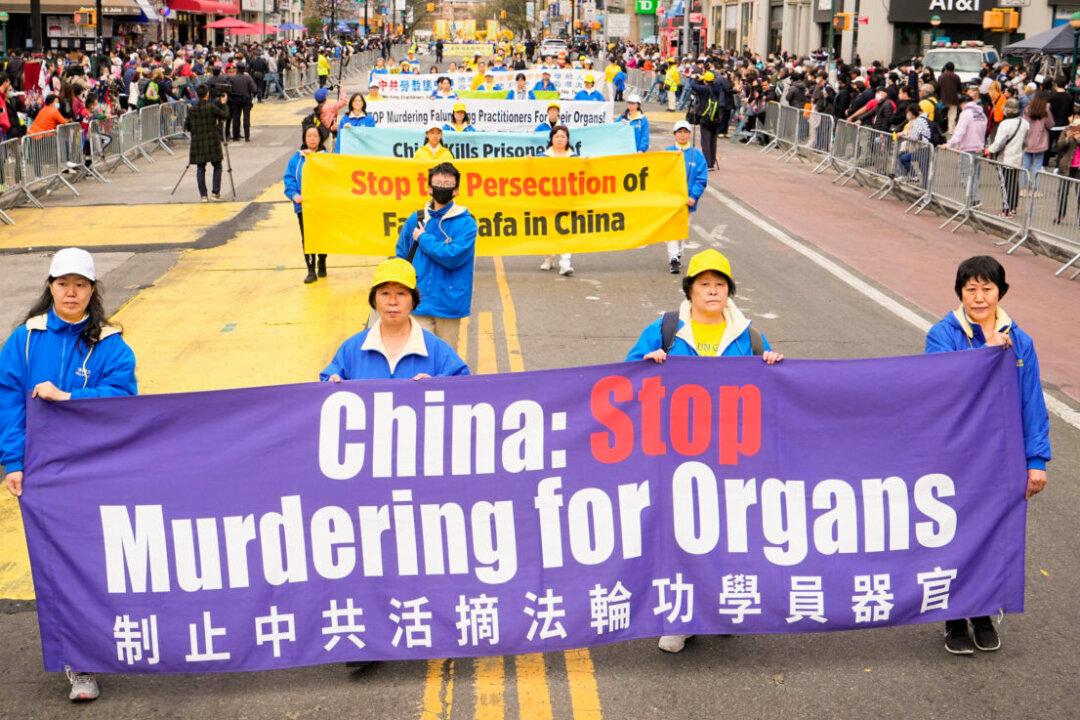The following remarks were prepared for a Japanese book tour, from June 2 to 6, 2014. They are based on a fuller talk given at a public lecture at the University of Toronto in May, available here.
I want in this talk to cover two topics: the evidence of the killing of Falun Gong for their organs; and recent developments in China on this issue.
Evidence
Falun Gong is a set of exercises with a spiritual foundation, started in 1992 with the teachings of Li Hongzhi, initially encouraged by the Communist Party but then repressed in 1999 after it got too popular. A woman with the pseudonym Annie made a public statement in Washington DC in March 2006 that her ex-husband had been harvesting corneas of Falun Gong practitioners in Sujiatun Hospital in Shenyang City in Liaoning province from 2003 to 2005. Other doctors had been harvesting other organs. The Falun Gong practitioners were killed through the organ extraction and their bodies were cremated. The organs were sold at high prices to transplant tourists. The Chinese government immediately denied what Annie said.
Shortly after, a Washington based NGO, the Coalition to Investigate Persecution against the Falun Gong asked me and David Kilgour to investigate whether what Annie said was true. David Kilgour and I accepted the invitation, conducted the investigation and concluded that Falun Gong practitioners have been and are being killed for their organs. The results of that investigation are set out in the two books on sale here today, Bloody Harvest and State Organs. I thank the publishers of the Japanese language versions of these works, Aspect and Jiyuusha.
Bloody Harvest is the third and most recent version of the report David Kilgour and I wrote. After our report came out, Dr. Torsten Trey founded an NGO, Doctors against Forced Organ Harvesting or DAFOH. State Organs is a collection of essays from authors around the world mainly transplantation professionals; the book is edited by me and Torsten Trey. While it would take far too long for me to go through all the material in the two books which supports the conclusion that Falun Gong are being killed for their organs, I will mention here a few bits.
• Investigators made calls to hospitals throughout China, claiming to be relatives of patients needing transplants, asking if the hospitals had organs of Falun Gong practitioners for sale on the basis that, since Falun Gong through their exercises are healthy, the organs would be healthy. We obtained on tape, transcribed and translated admissions throughout China.
• Falun Gong practitioners and non-Falun Gong practitioners alike who were detained and who then got out of detention and out of China told that,
1. Falun Gong practitioners were systematically blood tested and organ examined while in detention. Other detainees were not. The blood testing and organ examination could not have been for the health of the Falun Gong practitioners since they had been tortured to recant; but it would have been necessary for organ transplants.
2. To avoid harm to people in their locality, many detained Falun Gong practitioners declined to identify themselves. Falun Gong practitioners who came from all over the country to Tiananmen Square in Beijing to appeal or protest were systematically arrested. Those who revealed their identities to their captors would be shipped back to their home localities. Their immediate environment would be implicated in their Falun Gong activities and penalized.
The result was a large Falun Gong practitioner population in detention whose identities the authorities did not know. As well, no one who knew them knew where they were. This population is a remarkably undefended group of people, even by Chinese standards. This population provided a ready source for harvested organs.
3. To their jailors, Falun Gong are not human beings entitled to respect for their human rights and dignity. The Party has engaged in a prolonged, persistent, vitriolic national and international campaign of incitement to hatred against Falun Gong. The campaign has prompted their marginalization, depersonalization and dehumanization in the eyes of many Chinese nationals.
• Patients we interviewed who went to China for transplants told that,
1. Waiting times for transplants of organs in China are days and weeks. Everywhere else in the world waiting times are months and years. A short waiting time for a deceased donor transplant means that someone is being killed for that transplant.
2. There is a heavy militarization of transplantation in China. Hospitals with a ready supply of available organs are often military hospitals. Even in civilian hospitals, the doctors performing operations are often military personnel. The military have a common culture with prison guards and readier access to prisoners as organ sources than civilian hospitals and civilian personnel do. In China, the military is a conglomerate business and the sale of organs is a prime source of funds.
3. There is an inordinate secrecy surrounding transplantation in China. The names of doctors are not identified. Patients are not allowed to bring their own doctors with them. Before our 2006 report came out, Chinese doctors used to provide letters to patients indicating the treatment given and counselled. The letters ceased after the publication of our report.
• The standards and mechanisms which should be in place to prevent the abuse are not in place, neither in China nor abroad. International organ transplant abuse should be treated like international child sex tourism, an offence everywhere with extraterritorial effect. However, so far that is not the case.
On the one hand, we have organ transplant abuse which is possible without legal consequences. On the other hand, we have huge money to be made from this abuse, as well as desperate patients in need of transplants. This combination is a recipe for victimization of the vulnerable. Standards and mechanisms to prevent the abuse need to be introduced.
• There is no other explanation for the transplant numbers than sourcing from Falun Gong practitioners. China is the second largest transplant country in the world by volume after the US. Yet, until 2010 China did not have a deceased donation system and even today that system produces donations which are relatively small. Until 2013, China did not have an organ distribution system. The organ distribution system in place today is limited to the relatively small number of donated organs, and does not distribute organs from prisoners. The living donor sources are limited in law to relatives of donors and officially discouraged because live donors suffer health complications from giving up an organ.
The Government of China at first took the position that all organs came from donations, even though at the time they did not have a donation system. They then acknowledged that the overwhelming proportion of organs for transplants in China came from prisoners but asserted that the prisoners who are the sources of organs are all sentenced to death. Falun Gong practitioners have been given short sentences for disrupting social order or sentenced to nothing.
Yet, the number of prisoners sentenced to death and then executed that would be necessary to supply the volume of transplants in China is far greater than even the most exaggerated death penalty statistics and estimates. Moreover, in recent years, death penalty volumes have gone down, but transplant volumes, except for a short blip in 2007, remained constant.
The onus does not fall on me to show that Falun Gong practitioners are being killed for their organs. I do not have to explain where China gets its organs for transplants. China does. It falls to the Government of China to explain the sourcing for their organs. Yet, they refuse to do so. The Government of China refuses to provide statistics on what they claim to be the primary source of organs, the death penalty, on the basis that these statistics are state secrets.
Recent Developments
Deputy Health Minister Huang Jiefu, in a statement to China Daily in August 2009, asserted that prisoners are “definitely not a proper source for organ transplants.”[1] In August 2013, Huang Jiefu said publicly that in November China would start phasing out the use of organs of prisoners for transplants. He observed that the practice of harvesting organs from inmates “tarnishes the image of China.” Huang added: “I am confident that before long all accredited hospitals will forfeit the use of prisoner organs.”
The Chinese Communist Party/State invited The Transplantation Society, an NGO which gathers together transplant professionals from around the world, to a meeting in Hangzhou China at the end of October 2013, to formalize the transition from prisoners to donors. Chinese Government Health Minister Bin Li began the meeting with a statement expressing the resolve of the Government “that the reliance of transplant centers upon organs from executed prisoners must cease”.
The report of the meeting stated: “... the leaders of 36 transplant centers made a written commitment to the cessation of organs from executed prisoners. More hospitals are anticipated in the days ahead.”
After this Hangzhou meeting, the promotion of transplant tourism into China continued. When David Kilgour and I began our work, it was common for hospitals in China on their websites to tout their work, promote their short waiting times, post their prices and even talk about how much money they were making from the business. This website information has now disappeared.
The Government of China has responded in a number of different ways to our research. One of the most persistent and active is cover up. When we cite a website, it disappears. When we quote a Chinese official, the official issues a denial. We have archived all information on which we relied emanating from the Government of China. So researchers who want to see the information we saw can still see it at archived postings. Nonetheless, the systematic take down policy has prevented researchers from within China seeing this information.
In light of this institutionalized coverup, it was surprising that one website posting continued even after the Hangzhou resolution -under the name Omar Health Care Service. This website dated from 2007 and changed over the years. It was originally Arabic and English at the same website, which explains the use of the name Omar. Later the website continued separately with different languages.
The website address was <www.cntransplant.com>. The website promoted transplants in Tianjin, China. The website was user friendly. It had forms to fill out and a system for remitting fees. The home page blurb stated:
“We are here to assist you in getting a kidney, liver or heart transplant in China. Please browse through the website to find out more information about our services and contact us for the next step. We are working directly with the most qualified two hospitals in China.”
The website was an unabashed pitch for transplant tourism.
It did not take long for The Transplantation Society to realize this time that they had been had. The Omar Health Care website promoting transplant tourism into China as well as other information prompted an open letter from The Transplantation Society to President of China Xi Jinping sent the end of February this year.
That letter stated:
“The Tianjin website http://www.cntransplant.com continues to recruit international patients who are seeking organ transplants ... the fact that foreign patients are still undergoing transplantation in China suggests that some hospitals are boldly and irresponsibly violating Chinese government regulations, thereby rendering the law a mere ‘paper tiger’. These centers are both jeopardizing the public trust at home and tarnishing China’s reputation on the international stage.”
The letter noted that “the anecdotal reports of patients returning from China to their native countries with complications from clandestine organ transplants are many” and gave one example. The letter stated that “Chinese media report that even as the new [organ donor] program is being piloted, it has already been infiltrated by persons driven by the same corrupt practices who have assumed authority for the distribution of organs.” The letter asked China to get matters right.[2]
The letter from the Society led to a couple of responses. One is that the Omar Health Care website is now gone. I do not have the exact date it was taken down because I was not checking it every day, but it was there as late as May 7th. I archived every page of the site in my hard drive and you can also see at least the home page yourself by using the way back search engine on the internet.[3]
The other development is that the Chinese government publicly abandoned the commitment to end the sourcing of organs from prisoners. Huang Jiefu, the man in charge of transplants in China, asserted that, rather than shifting from prisoners to donors for sourcing of organs, China would incorporate the sourcing of organs from prisoners into its donor system. He said “we will regulate the issue [inappropriate handling of organ donations from executed prisoners] by including voluntary organ donations by executed prisoners in the nation’s public organ donation system”.[4] He added “Judicial bodies and local health ministries should establish ties, and allow death row prisoners to voluntarily donate organs and be added to the computer organ allocation system”.[5]
Lest there be any doubt about what he meant, he elaborated more specifically in a Chinese language interview when asked about the commitment of the leaders of 36 transplant centers to stop sourcing organs from executed prisoners6. Huang Jiefu stated that the commitment from these 36 transplant centres “is not about not using organs from executed prisoners, but not allowing hospitals or medical personnel to engage in private transactions with human organs.”
Huang Jiefu made this statement before the publication of the names of the 36 centres in April 2014,[7] thus preventing the public from getting the mistaken impression that these 36 centres were actually going to stop sourcing organs from prisoners.
To the Communist Party of China, the word “donations”, like many other words such as “freedom” and “democracy”, has developed its own meaning. To the Party, “donations” encompasses sourcing from prisoners. The word “donations” is used to differentiate state sourced organs from private black market organs, a usage we find nowhere else.
If the sourcing of organs from prisoners were to end, then the killing of prisoners of conscience for organs would also end. The fact that the sourcing of organs from prisoners is now the official policy even of the reform elements of the Chinese transplant system means that the possibility of this short cut to ending the killing of prisoners of conscience for organs is gone.
The global transplantation profession is back to square one. All that effort to shift China gradually from prisoners to donors has gone nowhere.
Within the mass of Chinese state sourced organs, there will be some which do not come from prisoners and are truly voluntary. But, in the absence of transparency, how is one to tell what the truly voluntary numbers are?
The inevitable consequences must be drawn. The transplantation profession has developed a full and detailed list of policies to avoid complicity in foreign transplant abuse. A number of legal remedies have been proposed, and, in some countries, enacted. The full weight of policy and law must be engaged to avoid any foreign complicity in transplant abuse in China.
David Matas is an international human rights lawyer based in Winnipeg, Manitoba, Canada. On the book tour, he visited and spoke at Osaka, Nagoya, Yokohama, Tokyo, and Saitama.
____________________
Notes:
[1] Tania Branigan, “Executed prisoners are main source of Chinese organ donations,” The Guardian, Aug. 26, 2009.
[2] Matthew Robertson “International Transplant Community Raises Voice Against China’s Abuses” Epoch Times, April 7, 2014
[3] The best snapshot can be found here from Feb. 22, 2007.
[4] Shan Juan, “Gov’t seeks fairness in organ donor system for inmates,” China Daily USA, March 7, 2014.
[5] Matthew Robertson “Top Chinese Transplant Official Says There’s No Plan to Stop Using Prisoner Organs” Epoch Times, April 11, 2014
[6] http://dailynews.sina.com/gb/chn/chnpolitics/phoenixtv/20140304/12205515629.html
[7] “China organ donation and transplantation update: the Hangzhou Resolution,” Authors: Huang J.F., Zheng S.S., Liu Y.F., Wang H.B., Chapman J., O'Connell P., Millis M., Fung J., Delmonico F., Hepatobiliary & Pancreatic Diseases International: HBPD INT. 13(2): 122‑4, April 15, 2014.





